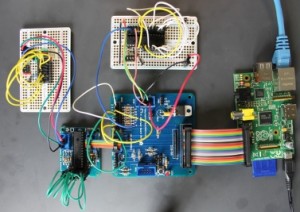Open Technology Workshop at Cambridge
Engineering Labs
I spend a delightful and stimulating day last Friday at the Cambridge Open Technology Workshop.I was joined by a friend who runs a lab at UCL. I've been trying for a while to persuade him that his teams should build more of their lab equipment. He's always resisted this; the powers that be tell him that researchers should do research, rather than build equipment.
 |
| Alexandre Kabla |
Alexandre Kabla's introduction gave a possible solution; why not get undergraduates to work on equipment as part of their project work? There was a splendid example of this approach on display in the afternoon.
Morning talks
In the morning we listened and learned from a series of 15-minute presentations. At the end of the morning sessions we heard lightning introductions to the afternoon's demonstrations.Alex Bradbury
The first morning talk, The Raspberry Pi as a building block for Creative Engineering, was delivered by Alex Bradbury. This was a great introduction to the talks that followed, as many of the projects used the Pi. Some also used Arduinos - more and more people have decided that the two complement each other very effectively.James Scott
Next came James Scott who works at the Microsoft Research Labs. He introduced the Microsoft .Net Gadgeteer ecosystem. It's a collection of hardware implementations of the Open Gadgeteer specifications, supported by Open Source software implemented within the .Net framework. MS use Gadgeteer boards to prototype new devices.Damien George
 |
| PyBoard |
Damien is a post-doc at DAMPT; Micro Python is a personal project. All the more impressive that he has managed to create a very useful, compact, quick implementation of Python that runs on a small and inexpensive microcontroller board.
I'll say more about Micro Python and the PyBoard in another blog post.
Laura James
Laura James wore two hats: as an advocate for the Open Knowledge Foundation and a member of Cambridge Makespace.Her talk was passionate and compelling. We have the technology to make available everything our civilisation has learned, and to make transparent the workings of Government at every level. We could, but we don't (yet); she argues that we must.
Laura delivered one bombshell: it seems that works licensed under the Creative Commons non-commercial license cannot safely be used by Educators. I've had to rethink the licensing on an e-book I'm writing, as I want it to be freely used in Primary, Secondary and Tertiary Education.
Andrew Moore
Andrew Moore told us about an Open Source initiative that has had profound consequences - the netFPGA project. One spin-off, the OSNT, does much of what commercial network testers costing £500,000 do, but at a fraction of the cost.Boris Adryan
 |
| Boris Adryan |
Boris runs the Adryan Computational Biology and Genomics Lab, in which there are many specimens that need to be maintained at a temperature below -80 C.
He came up with a solution involving chilled XRF boards from Ciseco (with custom firmware) within the refrigerators to report their temperature to a room-temperature Raspberry Pi.
The XRF boards coped with the low temperature, but the batteries didn't, until he replaced them with high-endurance versions, NASA approved, which will work for weeks at low temperatures. The batteries are not cheap, but they are readily available from Argos!
You can read more about the project here.
Boris has become deeply involved with the Internet of Things, and will be running a NodeRED tutorial at the CamJam on 5th July. There are still a few places available, so sign up soon!
Boris now runs an IoT consultancy Thingslearn Ltd. - it's @thingslearn on twitter.
Courous Mohtadi
Courous Mohtadi of Mathworks told us about MatLab and Simulink support for the Raspberry Pi and Arduino. I waited eagerly for an announcement of a free Pi version of Matlab - in vain.Jim Haseloff
Jim Hasselhof talked about Open Biology, including OpenPlant, and invited people to join the Cambridge Synthetic Biology Meetup. Â They meet each week at the Café Synthetique.Rachel Rayns
Rachel is the Artist-in-residence at the Raspberry Pi Foundation. She gave us some fascinating background to Zoë, her chatbot-cum-gardener. Her story included a van full of vintage cine equipment and a space called Soup Labs; remarkable.Zoë sounds like a lot of fun; I'm sure we will see more of her.
Garth Wells
Garth Wells told us about the lessons he had learned through his involvement with FEniCS, a community based around Open Source Software for automated, efficient solution of differential equations. The talk was excellent, and deserves a wider audience. I hope he publishes it.And an excellent afternoon
 |
| Josie Hughes in the afternoon |
Everyone I spoke to shared my enthusiasm for this event.
Thanks to Alexandre Kabla for organising it so well, and to everyone who contributed. It was fun, fascinating and informative.
I hope that OpenLabTools runs another event soon.




Comments
Post a Comment